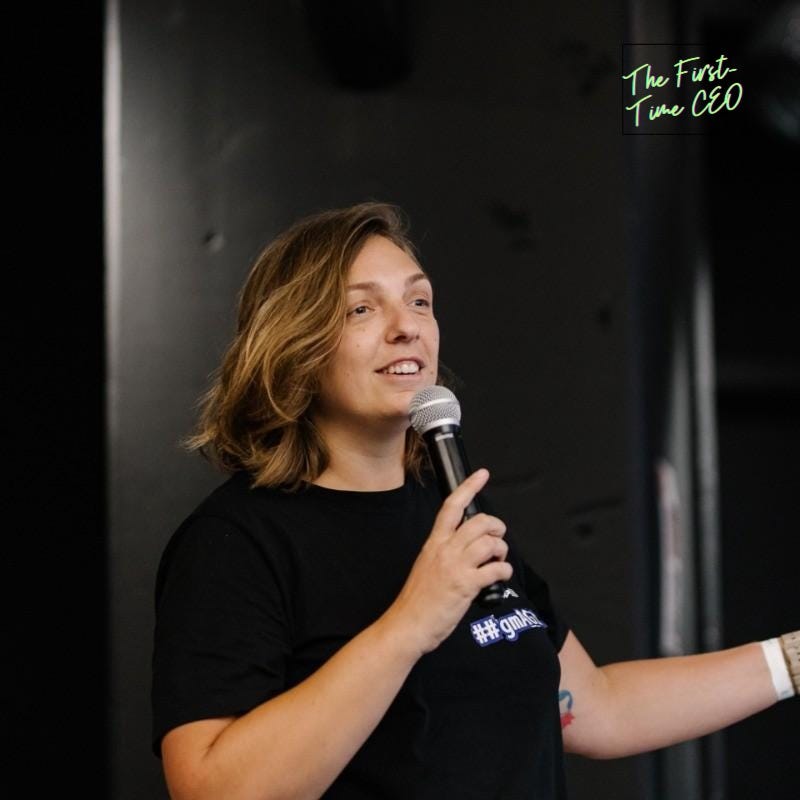Hi, Victoria here! I started The First-Time CEO to share not just my own journey, but the collective wisdom of new entrepreneurs. This project is about learning from one another — the lessons, skills, and insights that help us grow. From now on, I’m welcoming guest authors to share their experiences, tips, and perspectives so we can continue growing together as first-time CEOs. Want to share your knowledge? Press the button to contact me!
AUTHOR BIO
Maria Yarotska is the founder of Hackbox, a company that helps run hackathons for startups and ecosystems. She’s passionate about turning ideas into impact and mentoring first-time founders across Europe.
Foreword
As I’m writing this, my country — Ukraine — is mourning the loss of yet another handful of civilians, including children, killed in a night of rocket and drone attacks.
This is my daily reality as a founder and a professional: to keep going, to carry on with the work that can feel small against the backdrop of war. Survivor’s guilt is a powerful writer’s block.
So, if this finds you in a dark place, please remember — your work still matters. Founders keep the world moving: we solve problems, create jobs, and build things that didn’t exist before. And sometimes, that’s our own form of resistance.
Keep doing the right thing.
About me
I’ve started and co-founded projects across very different worlds — from Banka, a zero-waste shop I opened because my city didn’t have one (and somehow ended up winning hackathons for sustainable innovation), to Hackbox, a platform that helps others host their own hackathons.
So I’ve been on both sides of the table — the participant building from scratch, and the organizer watching hundreds of founders do the same.
That’s why I believe hackathons are not just competitions. They’re education through technical enablement — the fastest, most collaborative way to learn how to build.
What’s a hackathon, really?
The word gets thrown around a lot: ideathon, datathon, buildathon, hackathon. They all boil down to the same idea — learn by building fast.
You gather with people you’ve just met (or sometimes already know), you get a challenge, and over 24–72 hours, you ideate, prototype, pitch, and present.
You might:
Build your MVP
Meet your future co-founders
Get feedback from mentors
Win prize money
Or simply spend the weekend surrounded by people whose brains feel on fire
It’s a crash course in execution and resilience.
Some hackathons only accept new ideas, banning existing startups. Personally, I think that’s short-sighted. Founders who are already committed to their ideas tend to contribute more meaningfully and are far more likely to stick around — especially if they find the right technical co-founder or partner during the event.
The paradigm shift: from Red Bull to Lovable
Two years ago, hackathons looked like this:
A room full of engineers surviving on pizza and energy drinks, working through the night. Technical mentors were the rockstars. Every now and then, someone would ship something brilliant or catch a bug that could’ve cost millions.
The goodie bag? A t-shirt, a granola bar, and maybe socks.
Today, it’s different.
A mom of two shows up with a real problem, zero coding skills, and an open mind. Two hours later, she’s using AI tools to build a market-ready prototype with a solid business model and GTM strategy.
Goodie bag? A UV water filter, a book, maybe a jetpack.
This isn’t a joke — it’s a paradigm shift that is changing my own value proposition for Hackbox.
Hackathon sponsorships are moving from developer tools to AI platforms. The business layer — storytelling, market validation, use case design — is almost as strong as the technical one.
Is AI stealing everyone’s job again? Not quite. Because the future belongs to mixed teams. Let a Rust developer spend an afternoon building with a pharmacist or a teacher — someone who deeply understands a real-world problem — and watch what happens.
That’s where the real magic is.
Why every first-time founder should do a hackathon
Hackathons compress what usually takes months of meetings and hesitation into a single, high-energy weekend.
If you’re already building:
Use a hackathon to test a new feature, find a teammate, or pressure-test your MVP.
If you’re thinking about building:
It’s the best way to start. You don’t need a co-founder or a big idea — just curiosity and willingness to learn by doing.
Hackathons aren’t ballrooms with keynote speeches; they’re workshops with soldering irons, code editors, and sticky notes. You’ll leave with something real — and more importantly, with the confidence to keep building.
How to find (and win) your first hackathon
There’s one for everyone. My team is helping organize an IRL hackathon in Lisbon in January – come by and say hi if you’re around: https://luma.com/yxrbeoyd
A good place to start online would be with the platforms like:
NASA Space Apps Challenge — one of the world’s largest and most accessible hackathons
Devpost — perfect for global online sprints
Dorahacks.io and TAIKAI.io — active Web3 and AI communities
And once you’re in, here’s my advice:
Read the judging criteria like scripture. Every winning project starts there.
Prioritize your storytelling. Don’t just show what you built — tell the story of why it matters.
Stay curious. The best teams are open to feedback and iterate fast.
Closing: The founder’s playground
As founders, we already know how to work under pressure, with limited resources, trying to collaborate with people we’ve just met. Hackathons feel exactly like that — even profit at the end is optional (however, unlike in business, there are very clear guidelines on how to win).
So why step out of your comfort zone again — and on a weekend, of all times? The answer is simple: innovation thrives in proximity. To get that Eureka moment, you have to show up, get your socks wet, and see what happens when ideas start to collide.
Happy hacking!

